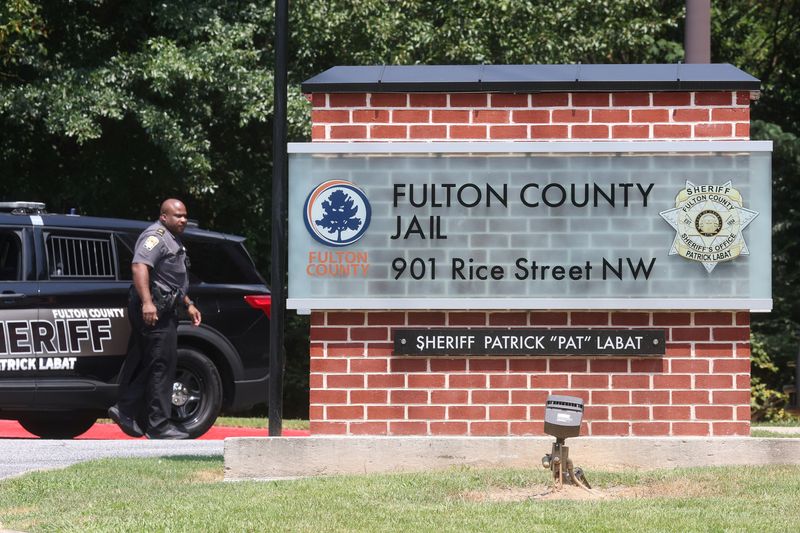By Jack Queen
ATLANTA (Reuters) - Donald Trump is set to surrender at an Atlanta jail on Thursday, a week after the Republican former U.S. president was indicted in Georgia over his efforts to overturn his 2020 election loss to Democrat Joe Biden.
Here is a look at the conditions of his bail:
NO THREATS
The $200,000 bond package to which Trump agreed on Monday includes standard provisions barring him from making direct or indirect threats against witnesses or his 18 co-defendants in the case, which concerns his efforts to overturn his 2020 election loss to Democratic President Joe Biden.
This applies to posts and reposts on social media, including Trump's own platform Truth Social, which he routinely uses to attack the legitimacy of the four criminal cases against him and the prosecutors who brought them.
Trump is also barred from talking directly or indirectly about the case with co-defendants or potential witnesses unless lawyers are present.
WHAT IF TRUMP VIOLATES THE AGREEMENT?
Judges in Georgia rarely revoke bail and would be extremely unlikely to do so over social media posts or inflammatory statements on the campaign trail, according to legal experts. Trump is seeking the Republican nomination to face Democratic President Joe Biden in the 2024 U.S. election.
The optics of jailing Trump as he campaigns to regain the presidency would be viewed by supporters as an affront to his free speech rights under the U.S. Constitution's First Amendment and fuel his narrative that the case is politically motivated, according to these experts.
Judge Scott McAfee does have the power to jail Trump if he crosses the line, and defendants sometimes have their bail revoked for egregious acts of witness tampering.
HAS TRUMP ADHERED TO BAIL TERMS IN OTHER CASES?
Trump has been indicted in three additional cases in Washington, D.C., Florida and New York. He has pleaded not guilty in all of them.
His social media postings have become a point of contention in the Washington case in which he is also charged with election subversion. Prosecutors told a judge that they were concerned Trump might be intimidating witnesses with a post saying: "IF YOU GO AFTER ME, I'M COMING AFTER YOU!"

U.S. District Judge Tanya Chutkan granted a prosecution request for a protective order barring Trump from disclosing sensitive evidence and grand jury information. Such orders are typical in criminal cases. But prosecutors said Trump's posts were a particular cause for concern.
Trump's bond bars him from discussing the facts of the case with potential witnesses without lawyers present. Unlike in Georgia, it does not explicitly restrict his social media posts.